
Revue d Histoire des Mathematiques
Scope & Guideline
Unveiling the Past: Where History Meets Mathematics
Introduction
Aims and Scopes
- Historical Analysis of Mathematical Texts:
The journal emphasizes the critical examination of historical mathematical texts, analyzing their content, context, and influence on the development of mathematical thought. - Interdisciplinary Approaches:
By integrating perspectives from philosophy, education, and the history of science, the journal fosters a multidisciplinary understanding of mathematics and its historical significance. - Focus on Lesser-Known Mathematicians:
The journal often highlights the contributions of lesser-known mathematicians and their works, providing a more inclusive narrative of mathematical history. - Geometric and Algebraic Developments:
A core area of focus includes the study of geometric theories and algebraic surfaces, tracing their evolution and the implications of these developments in broader mathematical discourse. - Cultural and Societal Context:
The journal explores the interplay between mathematics and societal factors, including the impact of historical events on mathematical practices and education.
Trending and Emerging
- 19th and Early 20th Century Mathematics:
There is a noticeable trend towards the exploration of mathematical developments during the 19th and early 20th centuries, reflecting an increasing interest in this transformative period in mathematics. - Textual and Quantitative Analysis of Historical Works:
Emerging methodologies such as textometry are gaining traction, indicating a trend towards quantitative analysis of historical texts to uncover patterns and influences in mathematical literature. - Mathematics and Social Contexts:
Recent papers are increasingly addressing the relationship between mathematics and societal factors, such as the impact of historical events on mathematical practices, demonstrating a growing interest in the socio-political dimensions of mathematics.
Declining or Waning
- Ancient Mathematics:
While ancient mathematics has been a significant area of study, recent publications indicate a decline in focus on this theme, with fewer articles exploring early mathematical practices and their historical contexts. - Mathematical Pedagogy in Historical Contexts:
There appears to be a waning interest in the historical pedagogical methods of mathematics, as fewer papers address the teaching practices and educational frameworks of past mathematicians. - Mathematics in Non-Western Cultures:
The exploration of mathematics within non-Western contexts is increasingly rare, suggesting a shift away from global perspectives in the history of mathematics.
Similar Journals
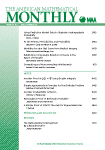
AMERICAN MATHEMATICAL MONTHLY
Fostering Dialogue Among MathematiciansAMERICAN MATHEMATICAL MONTHLY, published by Taylor & Francis Inc, is a prominent journal in the field of mathematics, recognized for its contribution to the dissemination of mathematical knowledge and pedagogy. With its ISSN 0002-9890 and E-ISSN 1930-0972, this journal has been a cornerstone for mathematicians since its inception, continuing to provide scholarly articles, educational materials, and insights into contemporary mathematical research. Although it follows a subscription model without Open Access options, its Q2 ranking in the Mathematics (miscellaneous) category reflects its reputable standing among peers, emphasized by its Scopus rank in the 22nd percentile. Based in the United States at 530 Walnut Street, Ste 850, Philadelphia, PA 19106, the journal spans topics that cater to both advanced researchers and aspiring students, facilitating an engaging dialogue within the mathematical community.
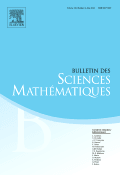
BULLETIN DES SCIENCES MATHEMATIQUES
Connecting Researchers to the Heart of MathematicsBULLETIN DES SCIENCES MATHEMATIQUES, published by Elsevier, is an esteemed journal dedicated to the field of mathematics, particularly excelling in miscellaneous mathematical disciplines. With an impressive Q1 category quartile ranking in 2023, it positions itself among the top tier of journals in its field, reflecting its commitment to high-quality research and scholarship. The journal operates under the ISSN 0007-4497 and E-ISSN 1952-4773, facilitating a robust platform for sharing pioneering mathematical theories and applications. Researchers, professionals, and students will find invaluable insights and comprehensive studies here, aiding in the advancement of mathematical knowledge and fostering collaboration across disciplines. The journal's comprehensive scope includes a broad range of topics, ensuring it remains at the forefront of mathematical research until its convergence in 2024. Whether you are seeking to publish groundbreaking findings or to stay updated with the latest advancements in mathematics, the BULLETIN DES SCIENCES MATHEMATIQUES is a definitive resource for the academic community.
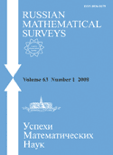
RUSSIAN MATHEMATICAL SURVEYS
Bridging theory and practice in the mathematical sciences.RUSSIAN MATHEMATICAL SURVEYS is a leading scholarly journal published by the Steklov Mathematical Institute of the Russian Academy of Sciences, dedicated to advancing the field of mathematics since its inception in 1970. With an ISSN of 0036-0279 and E-ISSN of 1468-4829, this journal publishes comprehensive surveys and research papers that span a variety of mathematical disciplines, offering insights into new theories and methodologies. Ranked in Q2 of the mathematics category and positioned at the 62nd percentile among general mathematics journals in Scopus, it serves as an essential resource for mathematicians, researchers, and students alike. While it currently does not offer open access options, its significant impact on the mathematical community is reflected in its rigorous publication standards and wide readership. The journal plays a crucial role in disseminating cutting-edge research and promoting mathematical discourse within the global academic community, making it a must-read for anyone invested in the dynamics of modern mathematics.

Japanese Journal of Mathematics
Championing Quality Research in MathematicsThe Japanese Journal of Mathematics, published by SPRINGER, stands as a premier platform for the dissemination of high-quality research in the field of mathematics. With its ISSN 0289-2316 and E-ISSN 1861-3624, this prestigious journal has been continually contributing to the academic community since its inception. Spanning a broad range of mathematical disciplines, the journal enjoys a strong reputation, recognized in the 2023 category quartiles as Q1 in Mathematics (miscellaneous), placing it among the top-tier journals in the field. Its Scopus rank of #41 out of 399, which reflects an impressive 89th percentile, further underscores its influence and the quality of articles it publishes. The Japanese Journal of Mathematics is dedicated to fostering scholarly exchange and advancing mathematical research, making it an indispensable resource for researchers, professionals, and students alike. Although it does not offer open access, its comprehensive archives provide a wealth of knowledge for those seeking to deepen their understanding of mathematical theories and applications.
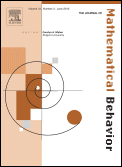
Journal of Mathematical Behavior
Transforming Understanding through Mathematical InsightsThe Journal of Mathematical Behavior, published by ELSEVIER SCIENCE INC, is a premier interdisciplinary journal dedicated to the exploration of mathematical thinking, learning, and education. With a strong history of publication since 1994 and converging towards 2024, this journal offers vital insights and innovative research in the fields of Applied Mathematics, Applied Psychology, and Education, holding notable rankings in various categories, including Q1 in Education and Q2 in both Applied Mathematics and Psychology as of 2023. The journal is positioned favorably in Scopus rankings, highlighting its impact in the realms of Mathematics and Education. It serves as a critical platform for researchers, educators, and practitioners aiming to enhance pedagogical strategies and foster effective mathematical understanding. Although it does not offer open access, the journal remains a cornerstone for advancing knowledge and dialogue within the mathematical education community,** making it an essential resource for anyone invested in the complexities and applications of mathematical behavior.

Bollettino di Storia delle Scienze Matematiche
Unveiling the Philosophical Roots of Mathematical SciencesBollettino di Storia delle Scienze Matematiche, published by FABRIZIO SERRA EDITORE, stands as a vital platform for the exploration of the rich history and philosophical underpinnings of mathematical sciences. With its origins tracing back to 2003, this journal primarily serves as an interdisciplinary forum where historians, philosophers, and mathematicians converge, reflecting the complex interplay between mathematics and its historical context. Although classified within the Q4 quartile for both the History and Philosophy of Science and Mathematics categories in 2023, the journal continues to stimulate critical discourse and encourage new avenues of research that challenge traditional narratives. While it is not an open-access publication, it is recognized for its scholarly rigor and contributes essential insights to the academic community, particularly those engaged in the nuanced study of mathematical practices through time. Researchers, professionals, and students alike will find valuable resources within its pages to inform their inquiries and broaden their understanding of the historical trajectory of mathematical thought.
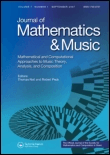
Journal of Mathematics and Music
Innovating Through the Intersection of Math and Melody.Journal of Mathematics and Music, published by TAYLOR & FRANCIS LTD, serves as a unique interdisciplinary platform that explores the intricate connections between mathematical principles and musical structures. With an ISSN of 1745-9737 and an E-ISSN of 1745-9745, this journal has made significant strides since its inception in 2007, converging its insights through to 2024. Positioned in a competitive landscape with a 2023 ranking of Q1 in Music and Q3 in several mathematics categories, it boasts a commendable Scopus rank of 19/180 in Arts and Humanities - Music. This journal emphasizes the mathematical models that underlie musical compositions and theoretical frameworks, appealing to a diverse audience of researchers, professionals, and students alike. For those interested in strengthening their understanding of the relationship between these two fields without the constraints of open access, the Journal of Mathematics and Music provides a vital resource for fostering innovative thought and collaboration across disciplines. Join leading minds in both music and mathematics as they contribute to this dynamic field of study.

Bulletin Mathematique de la Societe des Sciences Mathematiques de Roumanie
Pioneering Insights in the World of MathematicsThe Bulletin Mathematique de la Societe des Sciences Mathematiques de Roumanie, published by SOC MATEMATICE ROMANIA, is a distinguished platform dedicated to the dissemination of advanced mathematical research and developments. With ISSN 1220-3874 and E-ISSN 2065-0264, this journal serves the global mathematical community, particularly in Romania, fostering collaboration and innovation in varied mathematical disciplines. Despite being categorized in the Q3 quartile of the *Mathematics (miscellaneous)* field and holding a Scopus rank placing it in the 19th percentile, the journal remains committed to publishing high-quality articles that explore theoretical and applied mathematics. Running from 2008 to 2024, it aims to encourage the sharing of knowledge and advancements within both academic and practical domains, affirming its importance as a valuable resource for researchers, professionals, and students alike. Although the journal does not currently offer open access, it contributes to the mathematical discourse through the rigorous selection of papers that adhere to high scholarly standards.
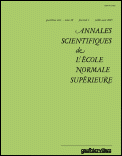
ANNALES SCIENTIFIQUES DE L ECOLE NORMALE SUPERIEURE
Discover Innovative Insights in MathematicsANNALES SCIENTIFIQUES DE L ECOLE NORMALE SUPERIEURE is a distinguished journal published by the Société Mathématique de France, dedicated to advancing the field of mathematics through high-quality research articles. With a robust impact factor and categorized as Q1 in Mathematics (Miscellaneous) as of 2023, this journal ranks in the top 16% of mathematics publications, showcasing its importance and influence in the discipline. Available in both print (ISSN: 0012-9593) and electronic formats (E-ISSN: 1873-2151), ANNALES SCIENTIFIQUES serves as a central hub for innovative mathematical theories and methodologies, appealing to a diverse audience of researchers, professionals, and students alike. The journal publishes research that spans various domains within mathematics, fostering a collaborative environment for idea exchange. As it converges from 1997 to 2024, it continues to shape the mathematical landscape, providing essential insights and developments within the global academic community. Located in Paris, France, the journal invites contributions that push boundaries and advance the understanding of complex mathematical concepts.
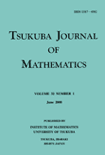
Tsukuba Journal of Mathematics
Exploring New Dimensions of Mathematical ThoughtTsukuba Journal of Mathematics is a distinguished publication dedicated to advancing the field of mathematics through the dissemination of innovative research and comprehensive studies. Published by the University of Tsukuba, Department of Mathematics, this journal serves as a vital platform for mathematicians, researchers, and students to engage with cutting-edge mathematical theories and methodologies. Although currently not available as an open-access journal, it maintains a strong academic presence, contributing significantly to the global mathematical landscape. The journal invites submissions across various branches of mathematics, aiming to foster scholarly communication and collaboration. The ISSN 0387-4982 and the E-ISSN 2423-821X further establish its credibility and accessibility among the academic community, supporting its critical objective of facilitating high-quality research output. Situated in Tsukuba, Japan, a hub for scientific research and development, the Tsukuba Journal of Mathematics is committed to bridging gaps in mathematical knowledge and encouraging exploration of novel ideas.